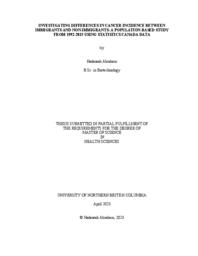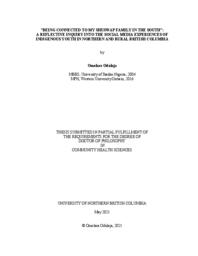Olson, Robert
Person Preferred Name
Robert Olson
Related Works
Content type
Digital Document
Description / Synopsis
Cancer continues to be a contributing factor to Canada’s healthcare burden and has large impacts on quality of life and survival. While Canada has a public healthcare system, there are different challenges faced by those born outside of the country, and it is important to study any disparities in cancer outcomes to offer more equitable solutions. The research performed for this thesis aimed to investigate the differences in cancer incidence between immigrants and non-immigrants in Canada. Using Statistics Canada data and linking of the 1991 Census, Canadian Cancer Registry, and Canadian Vital Statistics database, a cohort was followed from 1992-2015 to calculate the odds ratios and hazard ratios of cancer incidence for immigrants and non-immigrants. The results support previous research in the field, specifically the existence of a healthy immigrant effect where immigrants have lower odds of developing cancer incidence in comparison to their Canadian-born counterparts. Results also show this effect decreases over time spent in the country, aligning with previous research. This study demonstrates the complexity of this phenomenon and suggests some factors that contribute to the healthy immigrant effect after controlling for various demographic and socioeconomic factors in the regression models. These results contribute to this area of research and also highlights the need for future studies to examine individual-level health behaviours and other factors that impact the differences in cancer incidence between immigrants and non-immigrants in Canada.
Origin Information
Content type
Digital Document
Description / Synopsis
This research extends and explores two key concepts. First, cultural preservation is important to Indigenous health and wellbeing. Second, when Indigenous youth spend quality time (whether online or offline) on issues pertaining to their identity and sense of self, that time can be key to preserving Indigenous cultures. This research project was an exploratory study carried out using a variety of research methods, including online surveys, semistructured interviews, and open ended storytelling engagements. In this study, youth ages 15 to 24 years interacted with one another in online and offline spaces, which in some cases served as culturally safe wellbeing sites where their self-esteem increased, especially if they were mentored by Indigenous peers and adults. This study found out that Indigenous youth are active social media users and engage in all kinds of activities including self presentation, social connections, cultural activities, and advocacy. The risks and benefits of using social media for identity expression and cultural engagement were identified, but some youth were noted to require supports to engage safely on social media to derive maximum benefits. The interdisciplinary nature of the research merges concepts, theories, and ideas from First Nations Studies, Sociology, Community Health, and Media Studies. This project embraced methodologies employed in these various disciplines but used a Two-Eyed Seeing framework as a tool to ensure cohesiveness in the research and respect for Indigenous cultures and cultural protocols. The research ultimately unfolded using lenses of both Indigenous and nonIndigenous worldviews, which I believe contributed greatly to the richness of the findings.
Origin Information


